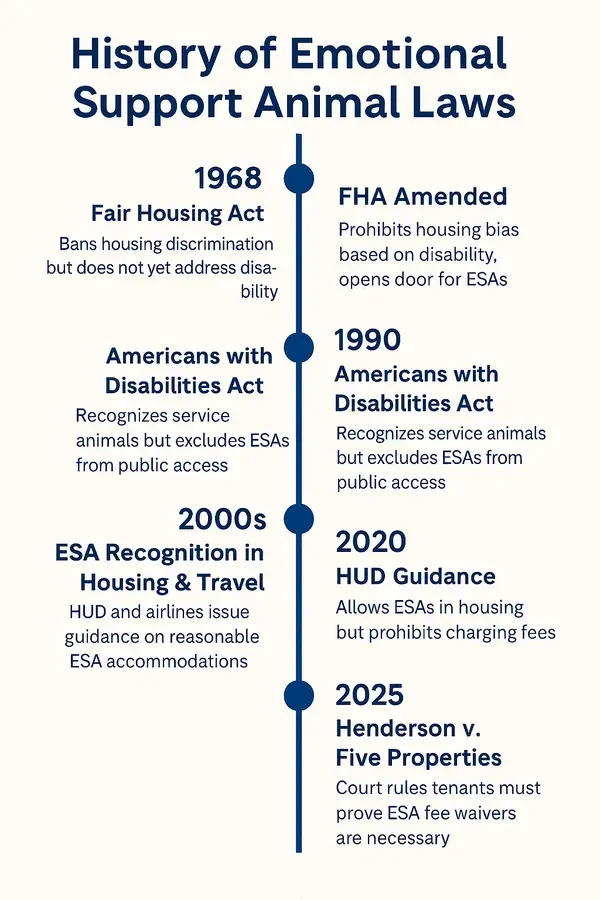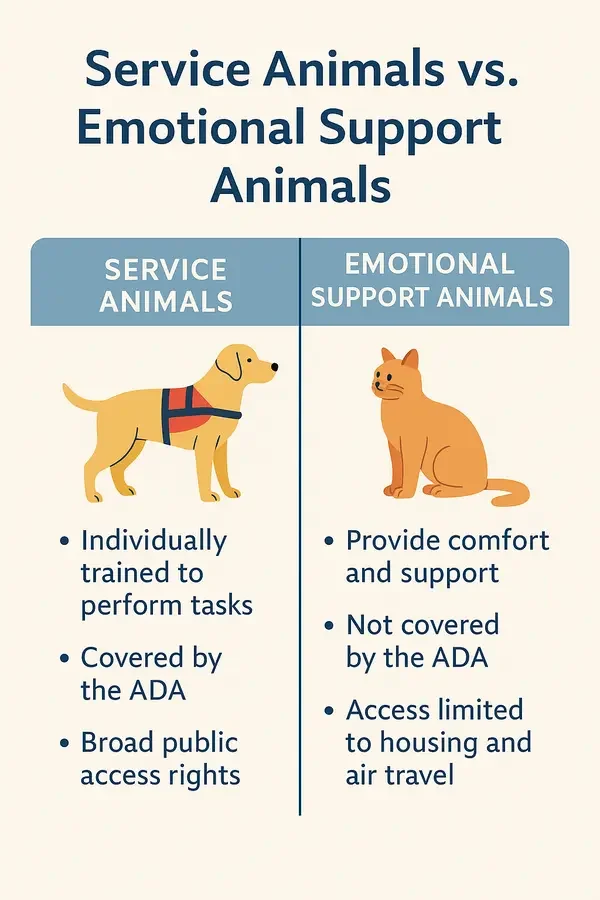Texas Emotional Support Animal Housing Laws Facing Change
Imagine this: You find your dream home in San Antonio, Texas. It’s quiet, pet-friendly—except the landlord says no pets allowed. You hand them an emotional support animal letter expecting smooth sailing. Instead, you’re hit with a pet deposit and extra monthly fees.
You’re not alone. Across the state, Texas emotional support animal housing laws are becoming a legal flashpoint in rental housing. Landlords and tenants alike are unsure what’s truly required, what’s negotiable, and where courts are drawing the line.
Table of Contents
History of Emotional Support Animal Laws
The story of ESA protections doesn’t begin with pets — it begins with civil rights law.
1968: Fair Housing Act (FHA)
Passed as Title VIII of the Civil Rights Act of 1968, the FHA banned housing discrimination on race, religion, sex, and national origin — but not yet disability.1988: FHA Amendments
Congress expanded the FHA to prohibit discrimination against people with disabilities. This opened the door for “reasonable accommodations” in housing — including the use of assistance animals. (HUD.gov)1990: Americans with Disabilities Act (ADA)
The ADA recognized service animals, granting them public access rights. Emotional support animals were specifically excluded, meaning they are protected under FHA housing rules but not ADA public access laws.2000s: ESA Recognition in Housing and Travel
HUD began issuing guidance confirming that emotional support animals qualify as assistance animals in housing. Airlines also permitted ESAs onboard, sparking a wave of registrations.2010s: ESA Misuse Concerns
As more people sought ESA letters online, criticism grew that some tenants (and travelers) abused the system. The New Yorker and The Cut reported on questionable ESA claims that blurred the line between legitimate need and convenience.2020: HUD Clarifies Guidance
HUD released a notice affirming landlords cannot charge fees for ESAs, but landlords retained the right to request documentation.2025: Henderson v. Five Properties
A federal ruling challenged HUD’s “automatic waiver” stance, requiring tenants to prove fee waivers are necessary, not assumed. (More below.)
Overview
Tenants: Legal Protections Under Texas ESA Laws
Federal and state fair housing laws protect people with disabilities who rely on emotional support animals. These laws apply regardless of pet policies, breed restrictions, or building type.
What tenants get:
No pet deposits or pet rent
Exempt from pet rules and breed/weight restrictions
Can request accommodations for any animal that helps manage a disability (even cats, rabbits, or birds—not just dogs)
What Tenants Must Provide:
A valid ESA letter written by a licensed mental health provider (LMHP)
A connection between the disability and the need for the ESA (must be outlined in the letter)
This protection comes from the Fair Housing Act (FHA) and the Texas Fair Housing Act, which make it illegal to refuse housing based on disability-related needs—including keeping an emotional support animal.
Landlords: Rights and Limits
While Texas landlords must comply with Texas emotional support animal housing laws, they still have rights:
Can require documentation from a licensed professional
Can deny ESAs that pose safety risks, are destructive, or cause an undue financial burden
Can charge for damages caused by the animal (but not upfront deposits)
Until recently, landlords assumed ESA-related fees were always waived. That changed on August 20, 2025.
🐶 🐶 Free Resource 🐶 🐶
Download our ESA Resource Fact Sheet to get access to Texas Emotional Support Animal Housing Laws that has been put in place by the presiding agencies.
Key Feature Comparison
| Feature | Tenants with ESAs | Landlords |
|---|---|---|
| Documentation | Must provide an ESA letter from LMHP | Can verify authenticity, but not demand diagnosis |
| Fees | Cannot be charged pet rent or deposits | Can deny waiver if it's an undue burden |
| Animal Type | Any domesticated animal | Can evaluate on a case-by-case basis |
| Breed/Size Rules | Not applicable | Can deny based on behavior, not breed |
| Behavioral Issues | Not protected if animal is aggressive | Can deny if ESA causes substantial disruption |
| Public Access Rights | Limited to housing only | N/A |
| ESA Registries | No legal registry required | Can reject third-party certificates without proper medical basis |
Landmark Court Case: Emotional Support Animal Fee Waivers Under Fire
In Henderson v. Five Properties LLC (2025), Judge Sarah Vance ruled that landlords are not automatically required to waive pet fees for tenants with ESAs.
Why it matters:
HUD guidance suggested fee waivers must always be granted.
The court rejected this, citing the end of Chevron deference (where courts deferred to agency interpretations).
Now, ESA fee waivers must be proven necessary, not assumed.
Judge Vance’s Ruling
Federal Judge Sarah Vance sided with the landlord. She ruled that simply having an ESA is not enough to automatically eliminate all fees. The tenant must prove that the fee waiver is:
Necessary to effectively accommodate their disability, and
Reasonable in the context of the housing provider’s operations.
In her written opinion, Judge Vance rejected the long-standing assumption that the U.S. Department of Housing and Urban Development (HUD) requires landlords to always waive fees for ESAs. She pointed out that HUD guidance, including its 2020 Notice and earlier joint statements with the Department of Justice, does not carry the weight of law—especially now that the U.S. Supreme Court has ended the legal doctrine known as Chevron deference, which used to give agencies like HUD broad authority to interpret laws.
This means courts no longer have to defer to agency interpretations if they’re not convincing on their own. In this case, Judge Vance found HUD’s arguments “unpersuasive” and lacking real legal support.
Why This Matters for Landlords in Texas
Though the case took place in Louisiana, it sets a legal precedent that landlords Texas emotional support housing laws could change by pointing to this case if they’re challenged on fee waivers for ESAs. The ruling emphasizes that ESA-related accommodations must be evaluated case by case, not granted automatically.
Judge Vance even laid out a framework for how landlords can assess whether a fee waiver is required:
Is the waiver essential to the tenant’s ability to use and enjoy the home?
How large is the fee compared to the overall housing cost?
How common are these fees for other tenants?
How important are these fees to the landlord’s income?
Has the tenant provided any proof that the fee is a financial barrier?
In Henderson’s case, the tenant failed to present any financial documentation or explain how paying the $400 fee would prevent her from accessing housing. Without that proof, the court found no reason to override the landlord’s standard policies.
Key Takeaway for Tenants
If you're requesting an ESA and asking your landlord to waive an animal fee, you may now need more than just a letter from a therapist. Under this ruling, you may need to show why the waiver is necessary, not just that you qualify for an ESA.
Documentation like:
Proof of income or financial hardship
A statement from your mental health provider explaining how the fee waiver impacts your treatment
Evidence that the fee would interfere with your ability to remain housed
could make or break your request.
Strategic Insight for Landlords
This decision gives landlords more legal clarity. You are still required to accommodate tenants with disabilities under the FHA and adhere to Texas emotional support animal housing laws. But when it comes to fee waivers, you can:
Ask for documentation showing that the waiver is necessary
Consider your financial capacity and fee structures
Deny the waiver if there’s no evidence it’s essential
However, this does not mean you can deny ESAs outright or ignore valid requests. You must still engage in the “interactive process” and evaluate each situation individually.
What Counts as an Emotional Support Animal?
An emotional support animal is not a pet. It’s an animal that helps relieve symptoms of a mental or emotional disability. Common qualifying conditions include:
Anxiety
Depression
PTSD
Panic disorders
Social phobias
You don’t need training or certification, but you do need a formal ESA letter that:
Is signed and dated by a licensed therapist, psychiatrist, or psychologist
States your mental health diagnosis qualifies as a disability
Explains how the ESA helps with your symptoms
There is no official U.S. registry for ESAs. Sites that offer "ESA ID cards" or "emotional support animal registration" are often misleading and not legally recognized.
Service Animals vs. Emotional Support Animals
This is one of the most common points of confusion, and the laws are very different.
Service Animals (Protected under ADA)
Must be trained to perform tasks
Only dogs & miniature horses qualify
Broad public access rights
Examples: guide dogs, seizure alert dogs, PTSD interruption dogs
Examples:
A guide dog for a blind individual
A seizure alert dog
A PTSD dog trained to interrupt panic attacks
Emotional Support Animals (Protected under FHA, not ADA)
No training required
Can be any domesticated animal
Protected only in housing situations
Require a licensed ESA letter
Key difference: Service animals can go with you to Target. ESAs cannot.
Real-Life Scenarios: Tenants and Landlords in Action
College Student in San Antonio
Maria, a college student living off-campus, has a diagnosed anxiety disorder. Her ESA is a rabbit named Biscuit. Her apartment complex has a no-pets policy. Maria provides an ESA letter from her therapist. The landlord accepts it and waives the pet deposit.
Why it worked: ESA letter was valid, and the request was simple—no fee waiver or large animal involved.
Houston Property Manager With 40 Units
Darren manages several small units and allows dogs but charges a $300 non-refundable pet deposit and $25/month pet rent. A tenant submits an ESA letter and requests all pet-related fees to be waived.
Darren references the recent court ruling and asks for documentation showing the waiver is necessary to the tenant's treatment plan.The tenant cannot provide more than the basic ESA letter, so Darren denies the fee waiver—but allows the ESA.
Outcome: Landlord followed the law under the new precedent. Tenant kept the ESA but paid regular fees.
Veteran in Fort Worth
James, a veteran with PTSD, rents a home where the landlord charges $500 per pet. He provides an ESA letter for his Labrador.
The landlord demands pet rent anyway. James files a HUD complaint. The landlord backs down after HUD contacts them.
Lesson: ESA protections override standard pet fees — unless landlords can prove the waiver is not necessary under the new ruling.
Pros and Cons of the Current System
For Tenants
Pros:
Protection from unfair pet policies
Ability to live in more places
No need for expensive training or registry
Cons:
Confusion between ESA and service animal laws
Some landlords still push back
Must prove “necessity” if seeking fee waivers
For Landlords
New legal tools to evaluate questionable requests could results in changes to Texas emotional support animal housing laws
Can deny if the request imposes financial burden
Damages can still be charged
Cons:
Must be careful to avoid discrimination lawsuits
Can't charge deposits or pet rent without strong legal grounds
Legal gray areas still exist in how to “verify” ESA letters
Conclusion and Next Steps
The rules around Texas emotional support animal housing laws are evolving.
Tenants: Don’t rely on bare-bones online ESA letters. Document your need thoroughly, especially if requesting a fee waiver.
Landlords: Don’t dismiss requests outright, but know you can require proof when waivers are requested.
The bottom line: An ESA letter alone may no longer guarantee free accommodations, but it remains a powerful legal tool. Both sides benefit from knowledge, documentation, and respectful negotiation.
FAQ: Frequently Asked Questions
-
Do landlords in Texas have to accept ESAs? In most cases, yes. A landlord can only deny an ESA that is a threat to the safety of other residents or likely to cause property damage.
-
Texas law generally follows federal guidelines for Emotional Support Animals (ESAs) under the Fair Housing Act (FHA), which protects ESAs in housing but not public spaces. To qualify for ESA protections, a licensed mental health professional must provide a written letter verifying the need for the ESA due to a mental or emotional disability. Landlords must make "reasonable accommodations," waiving pet fees and restrictions, but are allowed to ask for documentation of the disability and the animal's necessity.
-
Landlords are more than welcome to verify an ESA letter. The letters should come on the professional letterhead of the mental health professional along with their contact information, phone number, and email address. The letter will also include the therapist's license number.
-
In some cases, if your ESA letter is more than one year old, certain housing providers may request that you renew it. It's important to note that some therapists choose to include an expiration date on ESA letters, typically requiring them to be renewed annually.
-
Emotional support animals have protection under the FHA, but that doesn't mean they're immune to following rules ,and you can be evicted. Depending on how your dog behaves, your condition, and how your landlord handles their pet policies, it's possible to be evicted with an ESA.
-
The Texas Fair Housing Act prohibits discrimination in housing for certain populations including people with disabilities. This statute prohibits charging fees or deposits for service animals in housing but notes that the owner is liable for any damages done by the animal outside of normal wear and tear.
-
Step 1: Get the denial in writing with their specific reasons.
Step 2: Review your ESA letter and fix any issues.
Step 3: Address any legitimate concerns they might have.
Step 4: Give a clear response explaining your rights.
Step 5: File a complaint with HUD if they're being unreasonable.
Is this too much for you to manage as an individual landlord? We’ve got your back. Give us a shout and we can help.



